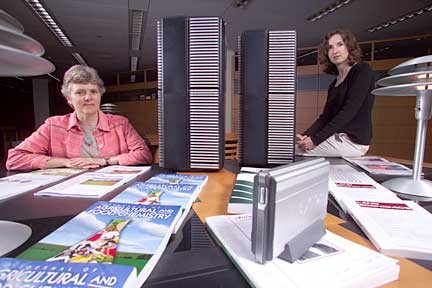Cornell's Mann Library now offers developing countries three kinds of low-cost access to agricultural and life sciences journals
By Susan Lang
Sebastian Chakeredza is an animal science lecturer at Africa University in Zimbabwe, where until recently, few academic journals were available, and the Internet and even electricity are unreliable. He used to obtain journal articles by mail, which took weeks, sometimes even months. By the time he had received an article, he sometimes would have forgotten why he asked for it in the first place.
Then Africa University obtained a "Library in a Box. " Developed by librarians and computing experts at Cornell University's Albert R. Mann Library, the resource is a set of 426 CD-ROMs containing full-text articles from 140 of the most important academic journals in agriculture and the life sciences. Now, Chakeredza has access to the journals' contents back to 1993. "It's critical to have access to published relevant literature. If you don't have it, you are hitting in the dark. It is the lifeblood of our business," said Chakeredza.
Mann Library is on the verge of selling its 100th Library in a Box, formally called The Essential Electronic Agricultural Library (TEEAL). The equivalent of an entire room's worth of print journals all compressed onto CDs, TEEAL provides some 2.2 million pages of academic articles to 100 institutions in 50 developing countries, from Vietnam, Bangladesh and Afghanistan to Senegal, Ethiopia and Malawi to Honduras, Bolivia and Peru.
Mann Library also is launching a new TEEAL system that eliminates the need for CD-ROMs because it runs on local area networks (LanTEEAL). As of July 1, qualifying libraries will be able to purchase a small, external hard drive that stores TEEAL's entire collection and can be accessed through local computers without the 75-pound tower of CD-ROMs in the Library in a Box.
"Researchers, like Sebastian Chakeredza, can now go straight to the literature; this eliminates the bottleneck of trying to get articles in remote places," said Nicole Joos, Mann Library's TEEAL project manager. "Otherwise, researchers are working in an information vacuum."
Some 110 low-income, food-deficit countries qualify for these resources. TEEAL costs $5,000 (which just came down from its previous price of $15,000 in the past month), with annual updates costing $1,000, although most institutions acquire grants from nonprofit organizations to cover the costs. LanTEEAL will cost $3,500. The fees help support the ongoing work to produce annual updates and support the training office in Zimbabwe, although the resources are sold at cost.
"Before, there was nothing available in Afghanistan, no scientific papers except for some out-of-date reports. Everything was destroyed," said Atifa Roman, a librarian at the Arid Lands Information Center at the University of Arizona. Roman, who was born in Afghanistan, helped Kabul University obtain a grant from the U.S. Agency for International Development to buy TEEAL. "Now researchers can get the full-text articles directly from Kabul University. Since we did the training last year, some 50 people a day are using TEEAL."
In Vietnam, a nutrition researcher who participated in a TEEAL user study said that while using TEEAL he learned that ractopamine, a chemical used in animal nutrition, can contribute to cancer. "After reading about it, I wrote a report for the ministry [of Agriculture and Rural Development] recommending the ban of ractopamine use in Vietnam and the importation of ractopamine-treated meat products," he said.
The TEEAL user study, funded by the Rockefeller Foundation, surveyed over 1,000 researchers, students and faculty at 17 institutions in 12 countries. The study found that TEEAL dramatically improved the productivity and quality of users' work and influenced how more than 60 percent of the users conducted their research.
For countries with reliable Internet access, there's a third option that's free: Mann Library is a partner in a program that provides a portal, called Access to Global Online Research in Agriculture (AGORA), through which universities and research institutions in 69 developing countries can access more than 700 refereed journals. So far, more than 450 institutions in 56 countries have registered to use AGORA. It is a public-private partnership led by the U.N. Food and Agriculture Organization in conjunction with scientific publishers, the Rockefeller Foundation, Cornell, Yale University, the World Health Organization and other donor agencies.
"It is important that researchers have access to research results across country borders," said Per Pinstrup-Andersen, the H.E. Babcock Professor of Food, Nutrition and Public Policy at Cornell. "TEEAL and AGORA are very important vehicles for facilitating such cross-country communication of results from agricultural research. Researchers in many developing countries have a particularly hard time getting access to the relevant journals, a problem that is significantly reduced by these two programs.
Media Contact
Get Cornell news delivered right to your inbox.
Subscribe